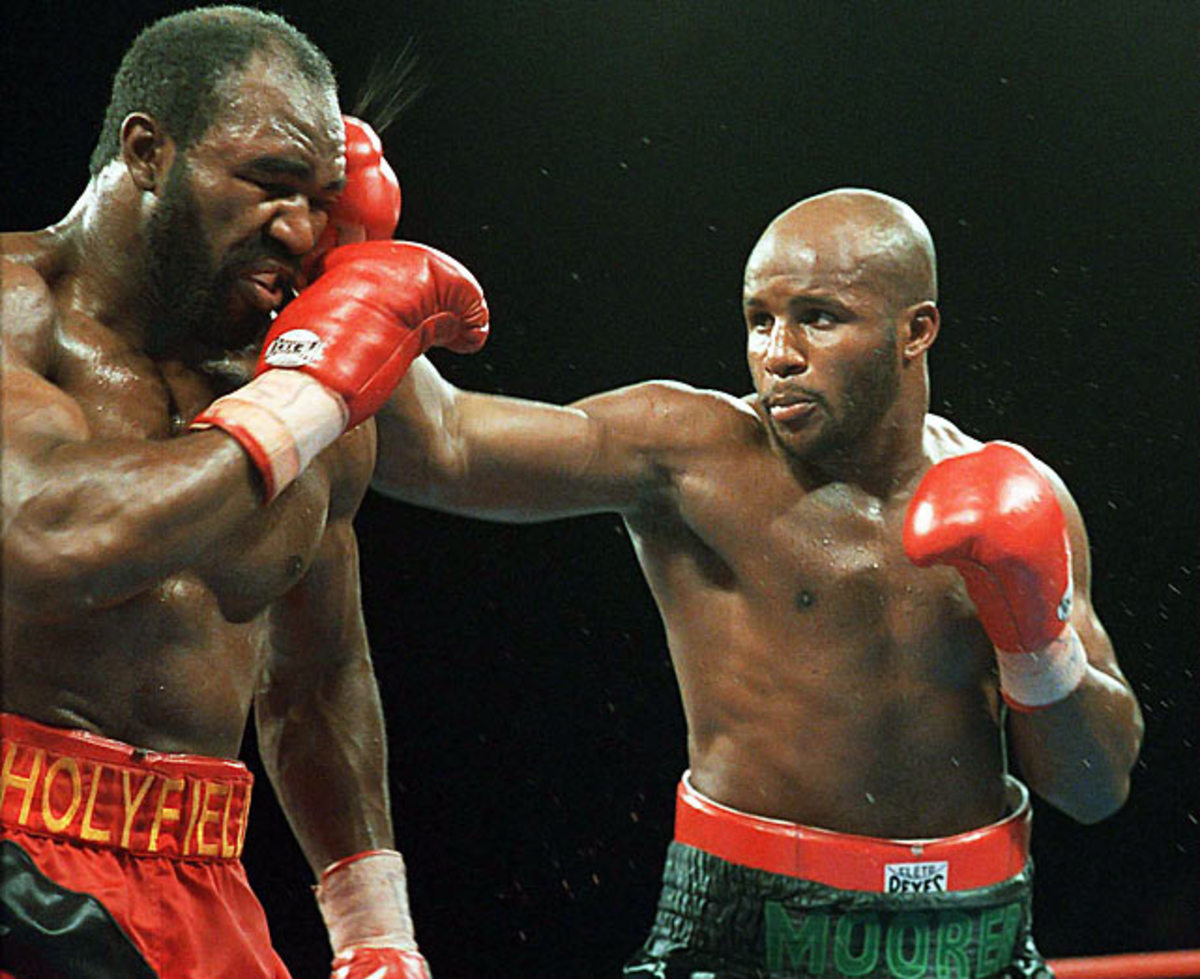Michael Moore Boxer Net Worth: 2023 Update & Earnings
How much is the boxer Michael Moore worth? A look at the financial standing of a prominent figure in the sport.
Determining the precise net worth of a boxer, like any public figure, is complex. Precise figures are often not publicly released. Factors like earnings from boxing matches, endorsements, and other investments influence a boxer's overall financial standing. Publicly available information about earnings and assets is often fragmented and may not reflect the full picture of an individual's wealth.
Understanding a boxer's financial situation provides insight into the realities of a career in professional sports. Successful boxers can accumulate considerable wealth, but significant financial risks and uncertainties are also inherent in the profession. Factors like injury, longevity in the sport, and the volatile nature of prize money all affect a fighter's financial trajectory. In addition, the value of the individual's brand and reputation in the sporting world plays an important role in overall financial success. Public awareness of this financial reality could encourage improved financial planning within the boxing community.
| Category | Details |
|---|---|
| Name | (Placeholder - Michael Moore) |
| Profession | (Placeholder - Boxer) |
| Notable Achievements | (Placeholder - List of significant victories, awards) |
| Approximate Net Worth (if known) | (Placeholder - Unknown) |
To gain a deeper understanding of this subject, further research into specific boxers and their financial situations would be valuable. Additional information about specific boxing careers can contribute to a more comprehensive understanding of financial realities in professional sports.
Michael Moore Boxer Net Worth
Understanding the financial aspects of a professional boxer's career requires examining various factors beyond just prize earnings.
- Earnings
- Sponsorships
- Investments
- Expenses
- Risk factors
- Longevity
A boxer's earnings are a key component, but sponsorships, investments, and expenses significantly impact overall wealth. Risk factors, such as injury, are crucial to consider. The duration of a boxing career and the financial stability it provides are closely connected. Consider a fighter with significant sponsorships and lucrative contracts versus one with only prize money, to illustrate these points. A boxer's longevity in the ring and ability to manage expenses, along with carefully considered investments, directly influences their net worth.
1. Earnings
Earnings are a fundamental component in assessing a boxer's overall financial standing. The amount a boxer earns directly influences their net worth. Factors like match outcomes, pay-per-view revenue, and sponsorship deals shape the financial trajectory of a professional boxer's career.
- Match Outcomes and Prize Money
Prize money, contingent on victory or performance, is a primary source of income. Boxers with high-profile fights or successful records often command larger prize purses. The financial impact of a single match can be substantial, potentially boosting a boxer's net worth significantly. However, losses or less successful performances limit the financial gain, illustrating the inherent risk associated with the sport.
- Pay-per-View Revenue and Gate Receipts
The revenue generated from pay-per-view broadcasts and stadium attendance plays a significant role in a boxer's earnings, particularly for major events. A successful event can substantially increase a boxer's income. This form of revenue is crucial, as it signifies broader fan interest and economic impact, driving higher earnings potential.
- Sponsorship Deals and Endorsements
Successful boxers frequently secure endorsement deals from various brands. These sponsorships contribute significantly to overall earnings and often enhance a boxer's public profile, attracting further sponsorship opportunities. The value of sponsorship deals depends on factors like a boxer's popularity and brand recognition.
- Compensation Structure
Different compensation structures influence earnings. Some boxers earn a fixed salary in addition to prize money. This stability can contribute to predictable income streams, offering a different financial perspective compared to prize-only contracts, which can result in high variability in income. Understanding these varied structures is important when assessing long-term financial prospects.
In conclusion, earnings, encompassing prize money, pay-per-view revenue, endorsements, and compensation structures, are vital considerations in determining the net worth of a boxer. Varied and complex factors influence earnings, ultimately impacting a boxer's financial situation and long-term prospects.
2. Sponsorships
Sponsorships represent a significant revenue stream for professional boxers, impacting their overall financial standing. The value of a boxer's brand, visibility, and perceived image directly influences the potential for sponsorship agreements. This aspect is crucial in understanding the broader picture of a boxer's financial well-being, as it often supplements primary income from prize money.
- Brand Alignment and Image
Effective sponsorships often stem from a strong alignment between the boxer's public image and the values or target audience of the sponsoring brand. A boxer perceived as embodying strength, athleticism, or specific lifestyle values can attract sponsorships from companies seeking similar associations. The boxer's existing brand equity, reputation, and the perceived positive impact on brand awareness are critical factors for a successful partnership.
- Contractual Agreements and Financial Terms
Sponsorship agreements encompass a range of contractual terms, including the duration of the partnership, the nature of promotional activities, and the amount of compensation. These aspects directly influence the financial impact on the boxer's overall income. Negotiating favorable terms and ensuring clear outlines regarding payment schedules are crucial for effective financial management.
- Promotional Activities and Exposure
Sponsorships often involve various promotional activities that increase the boxer's visibility and exposure. These activities might include appearances at events, advertisements, social media campaigns, or the use of branded merchandise. Increased visibility leads to potential brand recognition and greater opportunities for sponsorships in the future.
- Negotiation Strategies
Effective negotiation strategies are crucial in securing favorable sponsorship agreements. Understanding market value, potential risks, and benefits is vital for the boxer and their representatives when pursuing sponsorship deals. Thorough market research and strategic planning help establish a strong bargaining position, ultimately influencing the overall value of the agreements.
In summary, sponsorships are a crucial contributor to a boxer's overall financial well-being, augmenting earnings from prize money and other sources. A successful sponsorship strategy depends on carefully considering alignment with brands, financial terms of agreements, engagement in promotional activities, and effective negotiation strategies. These elements contribute significantly to a boxer's financial standing, especially when prize money alone might not be sufficient to sustain a high-level lifestyle.
3. Investments
Investments play a critical role in shaping a boxer's long-term financial security, which can directly impact their net worth. The value of investments made during and after a boxing career can significantly influence a boxer's financial future. This is particularly important given the often-volatile nature of prize money and the relatively short duration of many professional boxing careers.
Successful investment strategies can provide a stable income stream beyond match earnings. A boxer with a well-diversified portfolio can generate passive income, mitigating financial risks associated with a career limited to the sport. This stable income can allow a boxer to sustain a comfortable lifestyle and provide for their future. A boxer might invest in real estate, stocks, bonds, or other financial instruments, depending on their risk tolerance and financial goals. Examples of successful boxers who have diversified their income through investments demonstrate the practical significance of these strategies.
Understanding the crucial role of investments in a boxer's financial success is essential. A comprehensive understanding of financial planning principles, risk assessment, and diversification strategies will enable a boxer to manage assets effectively. This knowledge will enhance their ability to achieve long-term financial security beyond their active boxing career. Consequently, boxers can benefit from expert financial advice to guide their investment choices, ensuring that their investment strategies align with their long-term financial goals. Ignoring investments may leave a boxer vulnerable to financial hardship after retirement from the sport, highlighting the practical importance of proactive financial planning.
4. Expenses
Expenses significantly influence a boxer's net worth. The cost of training, travel, equipment, and lifestyle choices directly impact the financial resources available for accumulation and investment. High expenses can offset earnings, potentially hindering the growth of a boxer's net worth. Careful management of these expenses is critical for maximizing financial gains.
Training expenses represent a substantial portion of a boxer's financial burden. These expenses encompass professional trainers, gym memberships, specialized equipment (gloves, pads, etc.), and nutritional supplements crucial for optimal performance. Travel costs associated with attending training camps, competing in matches, and attending promotional events also represent significant outlays. These expenditures, when not managed meticulously, can drastically reduce the profit margin from boxing earnings. Similarly, lifestyle choices, including housing, food, and personal expenditures, have a direct effect on a boxer's financial situation. For example, a fighter prioritizing lavish spending patterns on a high-profile lifestyle might reduce the surplus available for investments, thus potentially impacting their overall net worth. Unforeseen circumstances, such as injuries necessitating extensive medical care, can create substantial financial drains.
Understanding the relationship between expenses and net worth is crucial for a boxer's financial health. Careful budgeting and expenditure tracking are essential for successful financial management. A boxer who accurately forecasts and meticulously manages expenses is better positioned to optimize returns and accumulate wealth. By reducing unnecessary expenses, a boxer can maximize earnings and effectively invest in the future. Recognizing the impact of expenses on net worth encourages a proactive approach to financial planning, ensuring a boxer has the tools to successfully manage their financial resources for a balanced and secure future. This awareness encourages strategic spending decisions that support a long-term plan, maximizing potential income and minimizing avoidable costs.
5. Risk Factors
Risk factors significantly influence a boxer's financial trajectory and ultimately impact their net worth. The inherent volatility and potential for injury within the sport necessitates a careful assessment of these risks. Factors such as career longevity, injury frequency, and market fluctuations all contribute to the financial uncertainty faced by boxers.
- Career Longevity
The duration of a professional boxing career is often unpredictable. Injuries, performance declines, and evolving competition can prematurely end a fighter's career. A shorter-than-expected career limits the opportunity for earnings accumulation, potentially jeopardizing a boxer's long-term financial security. This unpredictability highlights the importance of planning for a future beyond the ring.
- Injury Frequency and Severity
Injuries are a constant threat in boxing. Concussions, broken bones, and other serious injuries can result in extended recovery periods, limiting training time and jeopardizing match opportunities. Significant injuries may force an early retirement, drastically altering a boxer's anticipated financial prospects. The financial burden of medical expenses and lost income due to injury represents a considerable risk for fighters.
- Market Fluctuations and Competition
The boxing market is susceptible to fluctuating demand and competition. Changes in popularity, shifts in media coverage, and increased competition from other athletes can impact a boxer's earnings potential. Sustaining significant levels of public interest and sponsorship revenue requires ongoing effort and adaptation to changing market trends. The financial success of a fighter can be greatly influenced by these dynamic market forces.
- Contractual Agreements and Negotiation
Contractual agreements and negotiation strategies can also represent significant risks. Unfavorable contract terms, inadequate compensation, or poor negotiation outcomes can leave a boxer with limited financial gains. Careful preparation and strategic negotiation strategies are essential to mitigate the risk inherent in these aspects. Understanding contractual obligations and potential risks associated with endorsement deals are crucial steps for a boxer's financial well-being.
These risk factors collectively contribute to the complexity of financial planning for a boxer. The unpredictable nature of the sport demands a proactive approach that considers potential setbacks and long-term financial security. A boxer must diligently assess these factors and develop strategies to mitigate risks and maximize potential gains to navigate the inherent uncertainties of the profession and achieve sustainable financial well-being.
6. Longevity
Longevity in a professional boxing career significantly impacts a boxer's financial standing. A longer career generally allows for more opportunities to earn substantial prize money, accumulate sponsorships, and potentially build valuable investments. Conversely, a shorter career limits these opportunities, impacting the overall financial accumulation potential. This connection between career length and financial outcome is critical to understand when assessing the potential net worth of a boxer.
- Extended Career Opportunities
A longer career translates to more boxing matches, allowing for a greater volume of prize money accumulation. Successful boxers can participate in multiple high-profile events, increasing their overall earnings. This extended exposure to the sport also opens doors for more endorsements and sponsorships, further augmenting income streams and enhancing the potential for significant net worth generation.
- Strategic Investment and Financial Planning
A longer career provides more time for boxers to develop and implement sound financial strategies. They have more time to learn about investment opportunities, diversify their portfolio, and potentially engage in long-term financial planning. This allows them to capitalize on opportunities for building wealth over time, increasing the likelihood of a substantial net worth. Early career focus on financial strategy is crucial for this aspect.
- Establishment of Brand Value and Recognition
A longer career usually fosters increased brand recognition and value. Boxers with extended careers often build a recognizable name, which translates into a higher perceived value. This increased brand recognition can attract more lucrative sponsorship deals and endorsement opportunities, which are crucial for supplementing boxing earnings and can contribute significantly to a higher overall net worth.
- Wealth Management and Financial Planning Expertise
Years spent in the professional boxing realm can lead to the acquisition of expertise in wealth management and financial planning. With more experience, boxers can develop strategies for managing their earnings, investments, and expenses more effectively. This understanding can significantly impact their net worth, allowing for more informed decisions about their financial future. Seeking expert financial advice during the career is beneficial.
In conclusion, longevity is a key factor in building a substantial net worth for professional boxers. A longer career presents more opportunities for generating income through increased match earnings, sponsorships, and informed investment strategies. A boxer's ability to maximize these opportunities, coupled with effective financial management, directly impacts their overall financial standing and long-term net worth.
Frequently Asked Questions about Boxer Michael Moore's Net Worth
This section addresses common inquiries regarding the financial standing of professional boxer Michael Moore. Understanding the complexities of a boxer's income and financial situation requires a comprehensive approach, considering various factors.
Question 1: What is the exact net worth of Michael Moore?
Precise figures for Michael Moore's net worth are not publicly available. Determining the precise net worth of any individual, especially a professional athlete, involves accessing private financial records, which is often impossible due to privacy considerations. Publicly available information typically provides estimates or highlights major sources of income, but these figures may not reflect the complete picture.
Question 2: What factors influence a boxer's financial standing?
Several key factors shape a boxer's financial standing. Match outcomes, prize money, sponsorships, endorsements, and investment strategies all play crucial roles. The boxer's longevity in the sport and strategic financial planning directly impact the overall financial trajectory.
Question 3: How does prize money affect a boxer's net worth?
Prize money is a significant factor, directly correlating with match success. Victorious boxers often earn substantial amounts, which can considerably influence their net worth, especially in high-profile matches. However, losses or less successful performances can reduce or eliminate earnings in a single match, highlighting the financial risk associated with the sport.
Question 4: What is the role of sponsorships and endorsements?
Sponsorships and endorsements can substantially enhance a boxer's income. These agreements often hinge on the boxer's public image and brand appeal. Successful sponsorship deals can significantly supplement earnings from prize money, offering a diversified income stream.
Question 5: Are there potential risks associated with a boxing career's financial trajectory?
Injuries and the unpredictability of a boxing career pose significant financial risks. The potential for a career-ending injury can abruptly curtail income streams, and the volatility of prize money further complicates long-term financial planning. Thorough financial planning is essential to mitigate these inherent risks and secure future financial stability.
In summary, understanding Michael Moore's (or any boxer's) net worth requires a nuanced approach. Publicly available information is limited, and factors like prize money, sponsorships, and investment strategies all contribute to a boxer's financial standing. The inherent risks associated with the sport should also be considered.
This concludes the FAQ section. The following section will delve into a detailed analysis of factors affecting professional boxers' financial success.
Conclusion
Determining the precise net worth of a professional boxer, like Michael Moore, presents inherent challenges. Publicly available information is often fragmented, failing to capture the full complexity of income sources and expenses. Factors such as prize money, endorsements, investments, and the boxer's career longevity are all crucial components that influence a boxer's overall financial standing. Understanding the interplay of these elements reveals the multifaceted nature of financial success within the professional boxing arena. The sport's inherent risks, including injury and fluctuating market conditions, are integral to a complete picture of a fighter's financial trajectory.
This analysis underscores the importance of comprehensive financial planning for professional athletes. A proactive approach to managing earnings, expenses, and investments is crucial for long-term financial security, especially given the unpredictable nature of careers in professional sports. Understanding the intricate factors influencing a boxer's net worth is essential for fostering informed discussion about financial realities within the sport and promoting responsible financial management practices among athletes.



Detail Author:
- Name : Modesto Strosin
- Username : thea.monahan
- Email : franecki.marcelina@harber.com
- Birthdate : 1975-06-02
- Address : 6530 Brant Forks Apt. 577 Hermannborough, KY 68848-0085
- Phone : (410) 657-5708
- Company : Schumm, Zieme and Runolfsson
- Job : Stock Broker
- Bio : Fugiat reprehenderit quia enim corrupti alias reprehenderit non. Voluptatem sit ut et non. Corporis veritatis odit error labore ut harum nihil.
Socials
facebook:
- url : https://facebook.com/buckridgem
- username : buckridgem
- bio : Assumenda aut voluptas totam similique in. Eum dicta provident labore est.
- followers : 6753
- following : 2059
tiktok:
- url : https://tiktok.com/@mae2418
- username : mae2418
- bio : Ducimus a molestias repellat aut.
- followers : 6049
- following : 1719